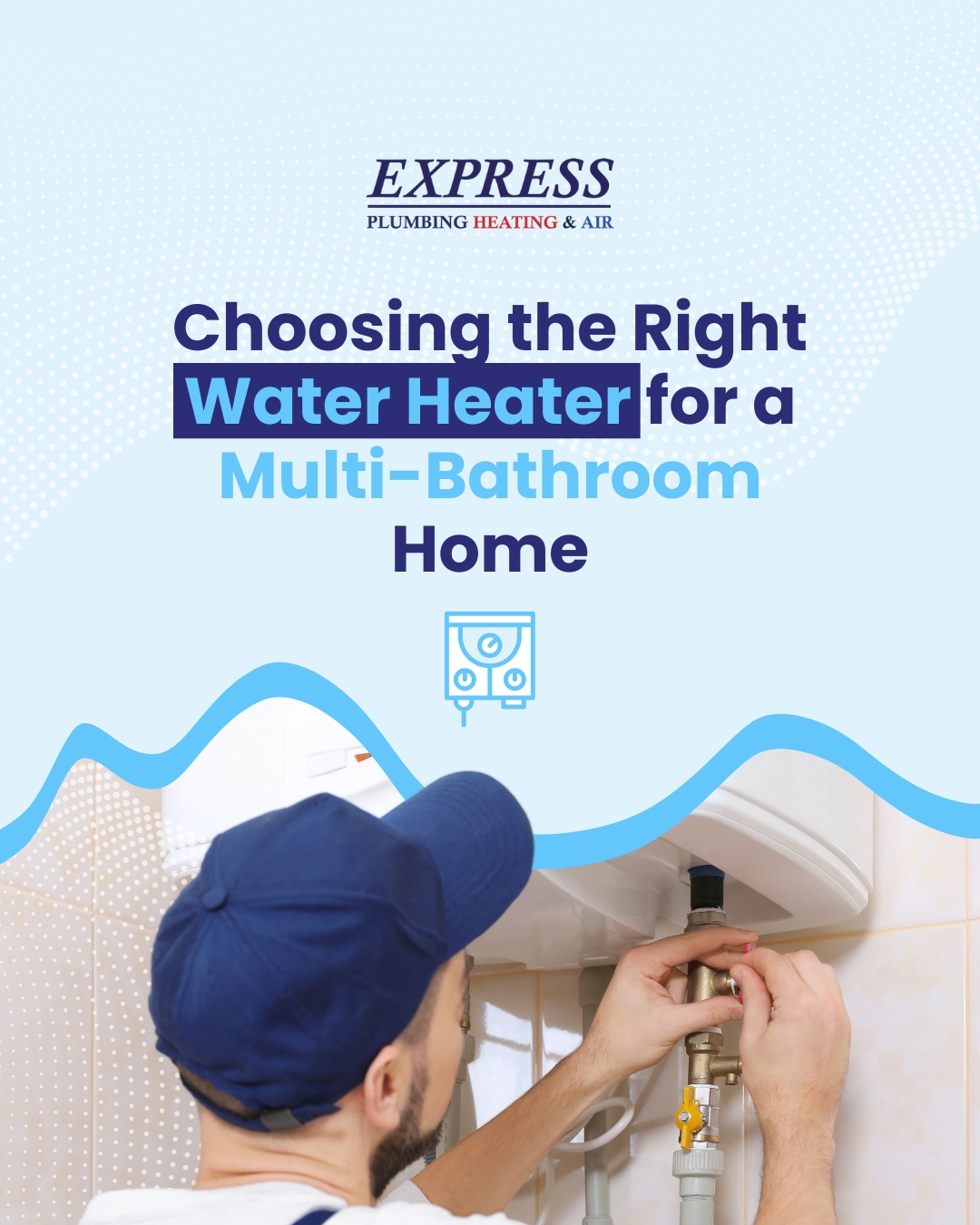The average Idaho resident uses 168 gallons of water per day, and if your home isn’t set up to handle your hot water needs, you’ll be left in the cold. If you’re tired of playing the hot water waiting game, Express Plumbing, Heating, and Air is here to help. Whether choosing a water heater or your interested in the best water heater for a large home with multiple bathrooms our team provides expert advice for all your water heater questions.
Why Multi-Bathroom Homes Require a Different Approach
Multi-bathroom and single bathroom homes have different plumbing requirements and a whole-house water heater might not meet your demands.
Higher hot water demand and simultaneous use
A house with multiple showers, appliances and sinks means more opportunity for simultaneous hot water use. This is especially true at peak times, like during the morning when everybody’s showering and getting ready, and in the early evening, when demand is high after the workday.
Risks of undersized systems
If your system’s undersized, you risk running out of hot water. The system will become inefficient and perform poorly, because it’ll struggle to meet your demands. This uses more energy, with longer heating cycles. Over time, the strain on the system will cause the water heater to fail prematurely.
Key Factors To Consider When Choosing a Water Heater
When deciding between a whole-house tankless water heater, a traditional water heater, and other types like solar-powered or condensing, it’s important to consider the following factors.
Household size and usage habits
The number of residents and the frequency of simultaneous water use are major considerations when choosing a water heater.
Number of bathrooms and fixtures
The water heater size for a 3-bathroom house is much different from the needs of a home with one bathroom. You’ll also want to consider the kitchen and laundry room, and how the appliances and fixtures will affect your overall water demand.
Recovery rate, gallon capacity, and GPM (gallons per minute)
In a tank system, the recovery rate is the time it takes to replenish hot water, while the gallon capacity is the amount of hot water it can store at one time.
The GPM (gallons per minute) is the amount of hot water a tankless system can produce at once. If the GPM is too low, you’ll constantly run out of hot water when you need it most. Whichever system you choose, it’s important to match the water heater capacity to your household demands.
Tank vs. Tankless Water Heaters: What’s Better for Large Homes?
There are pros and cons to both tank and tankless water heaters.
Pros and cons of tank systems
Tank systems have a lower upfront cost and higher upfront capacity, storing plenty of hot water available for immediate use. That said, the tank takes up space and the system uses more energy than a tankless system.
Pros and cons of tankless systems
Tankless systems have a higher upfront cost but once it’s installed, you’ll enjoy endless hot water and long-term savings thanks to the tank’s energy-efficient operation.
Advanced Options for High-Demand Homes
The following are advanced options to look into if you want to increase the efficiency or hot water capacity in your home.
Hybrid (heat pump) water heaters
Heat pump water heaters are energy efficient heaters that use electricity to move heat from the air into the water tank. These heaters are best for moderate demand homes, offering excellent long-term cost savings.
Point-of-use and zoned systems
A point-of-use system is installed close to the fixture, like a sink or faucet, heating the water in a small part of the house. A zoned water heater system is similar, dividing the house into different zones, each with its own heater.
These systems are ideal for homes with long pipe runs, three or four bathrooms, or multiple floors, and allow for more reliable hot water with customizable temperature settings in different areas of the house.
Energy Efficiency and Long-Term Cost Savings
An energy efficient water heater will save you money on your energy bills for years.
How to save on utility bills without compromising comfort
Adding smart thermostats, timers, and keeping your system well-maintained will save you money on your utility bills, while federal rebates can help you recuperate some installation costs.
Installation and Infrastructure Considerations
There are several worthwhile considerations when putting in a new water heater system, including installation and infrastructure.
Space requirements and venting needs
A water heater with a tank takes up much more space than a tankless system, which is a big consideration, especially if you have limited space.
Depending on whether it’s a gas or electric option, you may also need to consider appropriate venting, as combustion systems have to vent dangerous exhaust gases like carbon monoxide outside the home.
Electrical and plumbing system compatibility
You may need to upgrade your electrical and plumbing system to accommodate your new water heater, especially if you’re switching to a different type, or a higher-capacity model.
Professional sizing and installation guidance
Consult with a licensed plumber in Nampa, ID when having a new water heater installed as they connect to both the plumbing and electrical system. An expert from Express will help you choose the right size heater, and install it for you with precision, keeping your safety as a top priority.
When To Replace Your Existing Water Heater
Learn when to replace your current water heater system.
Signs your current system is too small or inefficient
If you’re always running out of hot water, your utility bills are rising, or you notice signs of age or rust, consider replacing your hot water system.
Is it better to upgrade now or wait until it fails?
Although a new water heater is a big investment, you’re better off having it replaced once it’s showing signs of malfunction, rather than paying high repair and emergency costs. You don’t want to be left without hot water due to system failure.
Contact Express Plumbing Today
Want to talk to a pro about getting a new water heater for multiple bathrooms? Contact Express Plumbing, Heating, and Air today. We’ll help you find the perfect system for your needs.
FAQs – Choosing a Water Heater for a Multi-Bathroom Home
Can a tankless water heater handle two or more showers running at once?
Yes, if it’s sized appropriately, you can run multiple showers, laundry, and more at the same time.
Do I need to upgrade my plumbing or electrical system for a new unit?
Not necessarily. Factors like home age, existing plumbing, and your electrical system will determine your upgrade needs.
Is it better to install one large water heater or multiple units?
It depends on the layout of your home. Larger homes with high demand may be better off with multiple units, while smaller homes will be okay with one water heater.




